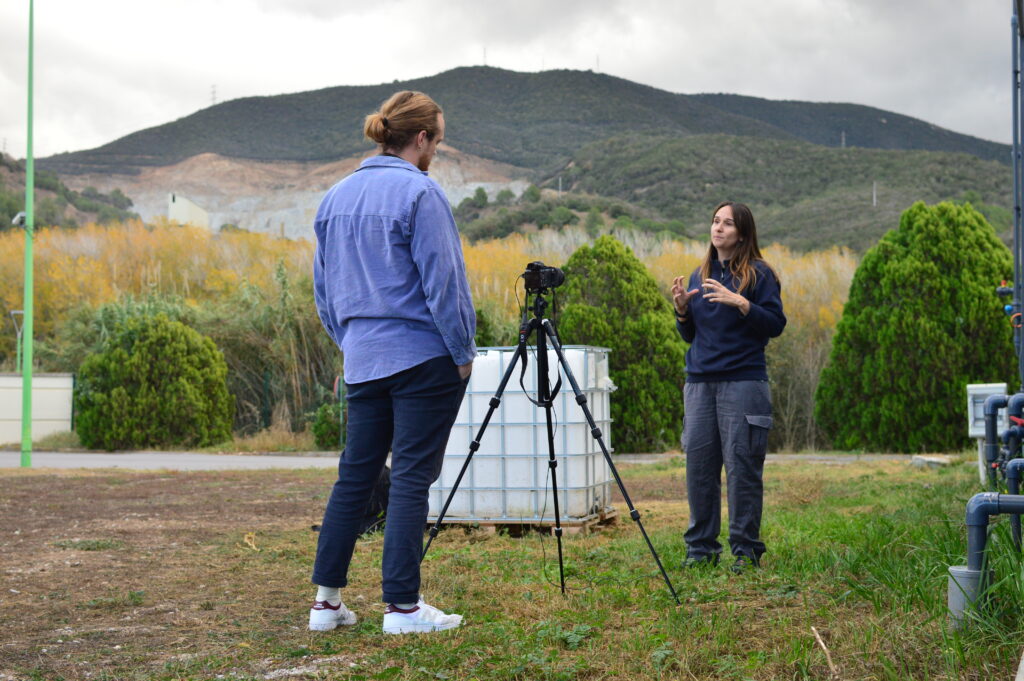15 Mar Reducing Wastewater Energy Consumption, Boosting Circularity in Drought-Hit Catalonia
A pilot study in Spain’s Catalonia region has succeeded in demonstrating a wastewater treatment process that not only harvests valuable resources like phosphates and nitrogen but also secures the recovery of almost 100% of water for reuse while reducing the energy expenditure in water purification by 25%.
These findings at a pilot scale study located at the La Llagosta Wastewater Treatment Plant (WWTP), which is just outside Barcelona, are given extra import within the wider context of severe drought and search for water solutions in the Catalonia region.
The pilot is Case Study 5 of the EU-funded WATER-MINING Project. This case study was set up by Sorigué at the WWTP, which is operated by local water institution the Consorci del Besòs Tordera. It is one of six such WATER-MINING case studies across Europe.

Jake Threadgould from REVOLVE and Teresa de la Torre from Sorigué
Teresa de la Torre, from Sorigué’s department of innovation, says: “The process we are studying here will allow us to reduce the energy consumption required for the water purification treatment by approximately 25% as well as recover almost 100% of water for agricultural, urban, environmental and industrial reuse.”
She adds the pilot is also working towards policies that will boost the acceptance of innovative technologies in society and increase circularity within the wastewater treatment industry. This is done through a community of practice that gathers local stakeholders like regional water authorities, universities, farmers, centres of technology, industry and more.”
María José Muñoz, innovation technician at Consorci del Besòs Tordera, adds: “The implementation of the pilot in the La Llagosta WWTP allows the technology to be validated in a real environment. The collaboration with different stakeholders at a local level allows us to learn their real needs and how they can be responded to.”
At this case study, researchers are recovering biogas, nitrogen and phosphates during the water purification process. The products can increase the circularity of the process: biogas has the potential to fuel the energy needed in the water treatment process; phosphates and nitrogen can be used in fertilisers, among other things, while pure water has a whole host of different uses. WATER-MINING’s Case Study 5 operates on a pilot scale but demonstrates the possibility of integrating circular systems in the wider wastewater treatment sector.
Teresa de la Torre adds: “In the new era of circular economy, WWTPs must be converted into biorefineries, where resources are recovered and sold as products. It is not easy to transform a conventional WWTP into a biorefinery and it entails costs, which is the main limitation here. However, it is a must, and contexts like the emergency that we are now suffering in Catalonia due to the drought will boost this kind of concept.”
ABOUT WATER-MINING
WATER-MINING is an EU-funded multidisciplinary research project that creates water management solutions using a circular economy approach. The project’s consortium consists of 38 public and private partners and four linked third parties from 12 countries and is led by the Delft University of Technology. WATER-MINING works with pilot sites in Cyprus, Spain, Portugal, Italy and the Netherlands to demonstrate new and efficient ways to reclaim nutrients, minerals, biopolymers, energy and freshwater from desalination, and industrial and urban wastewater. To successfully integrate these value-added products into resource supply chains, the project produces science-based, market-oriented policy recommendations, designs circular business models, and engages stakeholders, leading to sustainable management of water resources.
FOLLOW & SHARE
https://twitter.com/watermining
https://www.linkedin.com/company/water-mining/
CONTACT
Communication:
Nicole Heine; nicole.heine@dechema.de; DECHEMA e.V.
Josep Crous Duran; josep@revolve.media; REVOLVE.
